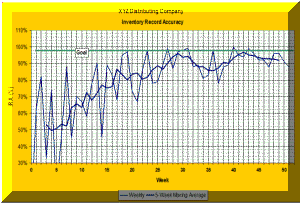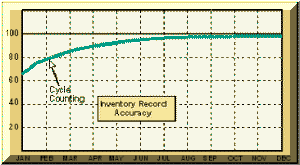Cycle Counting & Inventory Accuracy
What, Where, When & How
 What Is Cycle Counting?
What Is Cycle Counting?
Cycle counting finds and corrects inventory record errors. Cycle counters select a small sample of inventory items for audit each day. The selection is random or semi-random. When they find errors, they immediately correct them. Cycle Counting removes errors from the system, much like a physical inventory, but has significant advantages.
Cycle Counting Can...
- Achieve Very High Accuracies
- Level the Workload
- Reduce Inventory
- Continuously Measure Inventory Accuracy
- Function without Interruption of Operations
- Facilitate Process Improvement
- Eliminate The Annual Inventory Audit
How Cycle Counting Works
Cycle Counting uses the principle of statistical inference, just as in opinion polling. In figure 2, we take a random sample of 100 beans out of the "population" of 3000 beans. If 20% of those beans are red, it infers that 20% (600) of the population is also red.
Imagine each bean is a different inventory item and the red beans are items with erroneous records. If we cycle count 100 items (beans) and correct any errors in the records, we have estimated the accuracy of our inventory records (80%) and removed 20 errors.
Repeated over time, the process measures and improves Inventory Record Accuracy--provided that errors are removed faster than they are being introduced. A running chart, as shown in figure 3, thus shows whether the weekly volume of cycle counts is adequate.
Estimating the number of counts required each week and the staffing required to do them is always an issue when starting a new program. We address this in our training program, "Cycle Counting and Physical Inventories."
Cycle Counting Example
Figure 3 shows the results of a typical cycle counting program. IRA percentages in the first five weeks showed an accuracy of about 52%. As the program removed errors from the system, accuracy increased to about 96% by week 28.
The drop in accuracy from week 28 through week 35 indicates some change in the system. Fewer counts, perhaps, or volume may have increased or new employees may have introduced more errors.
Corrective action was taken about week 36 and accuracy rose again until about week 40.
From week 40 through week 52 the system is stable at about 93%. To improve further, the organization must 1) reduce the input error rate, 2) reduce transaction volume or 3) increase the number of weekly cycle counts.
Improving Count Effectiveness
Cycle counting can require large efforts, especially when IRA is in the 90%+ range. This is because it requires more counts to find each new error as accuracy increases. To improve error detection and reduce the number of counts required, several techniques are available.
- Segregate By ABC-- A-B-C classification applies to cycle counting as well as to other areas of inventory management. The highest cost and most important items (A-Items) get counted more often.
- Zone The Counts-- this technique groups daily counts into the same zone or area to reduce travel time for the counters.
- Zero on Book Condition-- This guarantees either a fast count or an error for correction.
- Zero on Shelf Condition--Another guaranteed fast count or error discovery.
- Negative Balance-- A guaranteed error discovery.
Hazards In Cycle Counting
Cycle counting is not always a panacea. things can and do go wrong and produce a lot of cost and effort with little result. among the hazards:
Insufficient Staffing--This results from under-estimating the number of counts required when the program is initially planned.
Diversion of Effort--To the rest of the organization, cycle counting seems to accomplish little of immediate importance. Cycle counters become a convenient source of staff for all sorts of odd jobs. Over time the practice of borrowing cycle counters dilutes the effort and reinforces the perception of non-accomplishment.
Ignoring Error Creation--Error prevention is always more productive than correction. Some systems create errors so fast that it is impractical to cycle count enough for high accuracy.
Insufficient Training--Cycle counters need training on counting properly and on resolving discrepancies. Others in the organization need training to support the program.
Motivation--Cycle counting tends to be boring and specific means should be employed for recognition and rewards.
What To Expect
Cycle counting, by itself, takes considerable time to show results. As accuracy rises to the 90% range, further results are even slower because each weekly sample contains fewer errors. Figures 3 and 4 illustrate.
With insufficient staffing and counting, the IRA curve can rise much slower or even decline as counters struggle against a tide of new errors. The key to improving effectiveness at high accuracies is prevention through reducing transaction volume and reducing transaction errors.
Cycle Count Implementation
There is, of course, more to implementing and designing a cycle count program than we present here. Cycle Counting, itself, can be and should be quite simple even if the statistical theory is not so simple.
■ ■ ■ ■ ■ ■ ■






